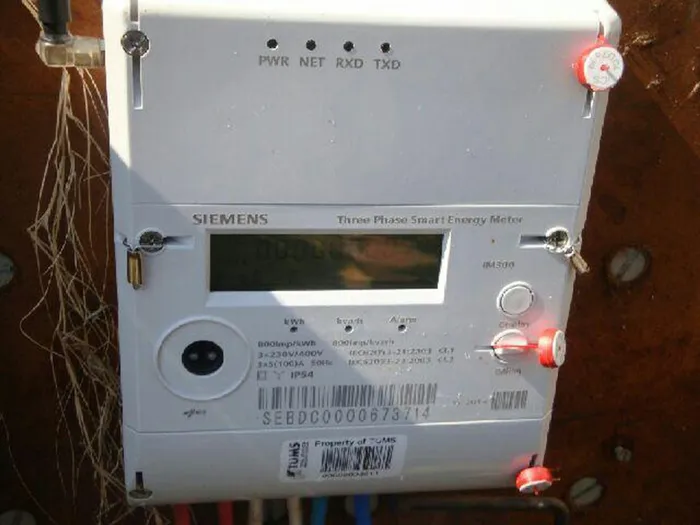The role of smart meters in addressing energy poverty in South Africa

One of the smart prepaid meters that were installed in the City of Tshwane.
Image: Supplied
Energy poverty in South Africa remains acute. Research from the Public Affairs Research Institute (PARI) shows that more than half of households live below the upper-bound poverty line, with a significant share on the food poverty line. This is the context in which affordability and food-versus-energy choices are made at kitchen tables every day.
Free Basic Electricity (FBE) was designed to ease this burden, but delivery is uneven across municipalities and coverage limited. Stats SA’s 2023 General Household Survey found that only about 14% of municipal electricity consumer units received FBE. This shortfall undermines access to affordable electricity at levels sufficient to drive socio-economic development and improve food security. Meanwhile, municipal finances are under severe strain, with arrears to Eskom approaching R100 billion.
In response, National Treasury has launched a smart-meter programme to improve billing accuracy and revenue collection. Under the R2 billion RT29 Transversal Programme, about 67 000 smart meters were installed in 2024/25 at an average cost of R7 463 per unit. The target is 250 000 meters by 2027/28.
Smart meters, however, cannot solve the systemic failures driving municipal revenue losses. These include the misappropriation of funds to politically connected service providers that fail to deliver, a long-standing culture of non-payment fostered by weak enforcement, inadequate infrastructure maintenance leading to technical losses, and a lack of forward planning.
International and South African studies show prepaid and smart metering can reduce consumption and improve collections. A National Bureau of Economic Research study on South African prepaid metering found that usage declined and utility profitability improved, particularly among previously delinquent customers. Other research shows poorer households respond by cutting consumption further and buying smaller amounts more frequently.
Smart meters are therefore an essential part of the solution, but they highlight a central dilemma: Technology strengthens municipal balance sheets but, without safeguards, can deepen energy poverty. PARI’s analysis shows how current tariff structures penalise low-use customers: prepaid users often face higher per-unit prices, while account customers pay fixed charges before buying units. Without affordability reform, enforcement will overshadow access.
A just approach to smart-meter rollout is possible, but it requires explicit safeguards:
• Tie rollout to affordability. Metering should support a pathway toward the minimum threshold level of consumption (MTLC), closer to 350 kWh per month, far above the 50 kWh FBE allocation. This can be achieved by combining FBE with targeted grants or lifeline blocks designed for low-use households.
• Reform tariff structures. Limit fixed charges for indigent households and ensure they face fair, affordable rates. Municipalities should also collaborate with private partners on grid maintenance, outage management, revenue collection, and embedded generation to reduce tariffs.
• Use meters as customer tools. Smart functionality enables real-time usage feedback, fairer billing, and bidirectional metering for rooftop solar and storage where regulations allow.
These features should be implemented as customer benefits, not only enforcement mechanisms.
The policy question is clear: when technology arrives, do the poorest households gain or lose access? Today, too few receive FBE, the benefit is far below developmental thresholds, and tariff structures still disadvantage low-volume users. Rolling out smart meters at R7 500 each without concurrent affordability reform risks shifting transition costs onto the poorest while benefitting politically connected suppliers.
Justice in the energy transition will not be achieved by hardware alone. It will be achieved when households can consistently afford enough electricity to cook, refrigerate food, run small businesses, or study at night without sacrificing nutrition. Smart meters can contribute to that outcome, but only if rollout is inseparable from tariff reform, affordability measures, and a genuine people-centred approach.

Thomas Garner holds a Mechanical Engineering degree from the University of Pretoria and an MBA from the University of Stellenbosch Business School.
Image: Supplied
Thomas Garner holds a Mechanical Engineering degree from the University of Pretoria and an MBA from theUniversity of Stellenbosch Business School. Thomas is self-employed focusing on energy, energy related criticalminerals, water and communities. He is a Fellow of the South African Academy of Engineering and aManagement Committee member of the South African Independent Power Producers Association.
*** The views expressed here do not necessarily represent those of Independent Media or IOL.
BUSINESS REPORT
k here to edit this text.